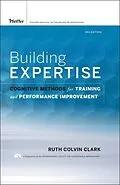This third edition of the classic resource, Building Expertise draws on the most recent evidence on how to build innovative forms of expertise and translates that evidence into guidelines for instructional designers, course developers and facilitators, technical communicators, and other human performance professionals. Ruth Colvin Clark summarizes psychological theories concerning ways instructional methods support human learning processes. Filled with updated research and new illustrative examples, this new edition offers trainers evidence-based guidelines to help them accelerate genuine expertise within their organizations.
Autorentext
The Author | Ruth Colvin Clark, Ed.D., a recognized specialist in instructional design and technical training, is the founder of CLARK Training & Consulting. Dr. Clark is a past president of the International Society for Performance Improvement (ISPI), a recipient of the Thomas Gilbert Award for Professional Achievement, and author of six books on instruction and learning including the best-selling e-Learning and the Science of Instruction coauthored with Dr. Richard Mayer.
Klappentext
Building EXPERTISE
This third edition of the classic resource, Building Expertise draws on the most recent evidence on how to build innovative forms of expertise and translates that evidence into guidelines for instructional designers, course developers and facilitators, technical communicators, and other human performance professionals. Ruth Colvin Clark summarizes psychological theories concerning ways instructional methods support human learning processes. Filled with updated research and new illustrative examples, this new edition offers trainers evidence-based guidelines to help them accelerate genuine expertise within their organizations. This new edition includes
- Eight instructional principles that can accelerate expertise
- Four instructional architectures to serve as design templates
- The most current research on how to develop learning that is both motivational and instructionally sound
- Completely updated review of relevant research from cognitive and instructional design fields
- Practical guidelines for problem-centered instruction, motivation, and transfer
- Information on how to exploit the features of new technology in ways that support human learning processes
Praise for the Third Edition of Building Expertise
Accelerating the development of expertise is crucial to organizations' ability to thrive in today's global economy. With sound theoretical framework and immediately applicable guidelines, Building Expertise is a must-read for every serious performance improvement professional.
ROSALINE TSAI, Ph.D., GLOBAL TRAINING DIRECTOR, Honeywell Building Solutions
Building Expertise synthesizes research into accessible design principles that can be easily applied to a broad range of instruction including eLearning and other innovative technologies.
FRANK NGUYEN, Ph.D, ASSISTANT PROFESSOR, Department of Educational Technology, San Diego State University
Zusammenfassung
This third edition of the classic resource, Building Expertise draws on the most recent evidence on how to build innovative forms of expertise and translates that evidence into guidelines for instructional designers, course developers and facilitators, technical communicators, and other human performance professionals. Ruth Colvin Clark summarizes psychological theories concerning ways instructional methods support human learning processes. Filled with updated research and new illustrative examples, this new edition offers trainers evidence-based guidelines to help them accelerate genuine expertise within their organizations.
Inhalt
Introduction: Getting the Most from This Resource.
PART I: FOUNDATIONS OF BUILDING EXPERTISE.
Chapter 1: Expertise in the Global Economy.
The Value of Expertise.
What Is an Expert?
Seven Lessons Learned About Experts.
Chapter 2: Four Ingredients of Instruction.
Which Media Are Best for Learning?
Four Components of Learning.
Three Views of Learning.
Four Instructional Architectures.
Chapter 3: No Yellow Brick Road.
Instructional Components and Learning: No Yellow Brick Road.
Graphics and Learning: A Journey Down the Yellow Brick Road.
Factors That Influence Learning.
Toward an Evidence-Based Profession.
About the Numbers.
Chapter 4: The Psychology of Building Expertise.
Two Memories for Learning.
The Transformation of Content into Knowledge and Skills.
Eight Principles for Instruction.
PART II: BASIC LEARNING EVENTS PROVEN TO BUILD EXPERTISE.
Optimizing Working Memory Resources.
Chapter 5: How Working Memory Works.
Working Memory: The Center of Learning.
New Content Has a Short Self Life in Working Memory.
Chess, Chunking, and Capacity Limits of Working Memory.
What Happens When Working Memory Is Overloaded?
Automaticity: A Working Memory Bypass.
Visual and Auditory Components in Working Memory.
Why Is Working Memory So Limited?
Working Memory and Performance.
Chapter 6: Managing Cognitive Load.
Cognitive Load Management Principle.
Methods That Bypass Working Memory.
Methods That Minimize Content.
Methods to Impose Content Gradually.
Methods to Minimize Unproductive Mental Work.
Methods to Maximize Working Memory Capacity.
Chapter 7: Managing Attention.
The High Price of Attention Failure.
The Attention Principle.
Instructional Methods to Support Attention.
Optimizing Attentional Capacity in the Classroom.
Methods to Focus Attention.
Methods to Support Selective Attention.
What Is Divided Attention?
Methods to Minimize Divided Attention.
Chapter 8: Leveraging Prior Knowledge.
The Prior Knowledge Principle.
Methods to Activate Prior Knowledge.
Methods to Compensate for Limited Prior Knowledge.
Avoid Activating Inappropriate Prior Knowledge.
When to Use Prior Knowledge Methods.
Chapter 9: Helping Learners Build Mental Models: Implicit Methods.
The Building Mental Models Principle.
Explicit and Implicit Encoding Methods.
Implicit Methods to Build Mental Models.
Graphics to Build Mental Models.
Personalize Your Learning Environment.
Include Deep-Level Learning Agent Dialogs.
Provide Examples and Encourage Their Processing.
Provide Effective Analogies.
Include Process Content in Your Instruction.
Offer Cognitive Support for Novice Learners.
Chapter 10: Explicit Methods for Helping Learners Build Mental Models.
Is Active Learning Better? A Tale of Four Lessons.
Building Mental Models Principle.
Explicit vs. Implicit Methods for Building Mental Models.
Maintenance vs. Elaborative Rehearsal.
Incorporate Frequent Elaborative Practice Exercises.
The Law of Diminishing Returns.
Distribute Practice Assignments.
Provide Explanatory Feedback.
Use Effective Questioning Techniques in the Classroom.
Actively Engage Learners with Graphics.
Promote Self-Explanations of Content.
Incorporate Collaborative Learning Opportunities.
Minimize Note-Taking in Instructor-Led Presentations.
Who Benefits from Practice?
Ch...
